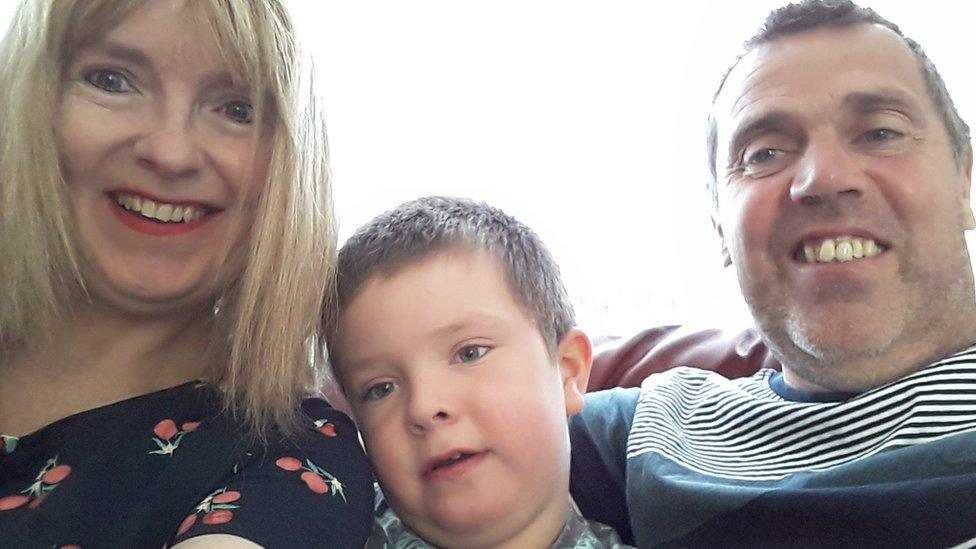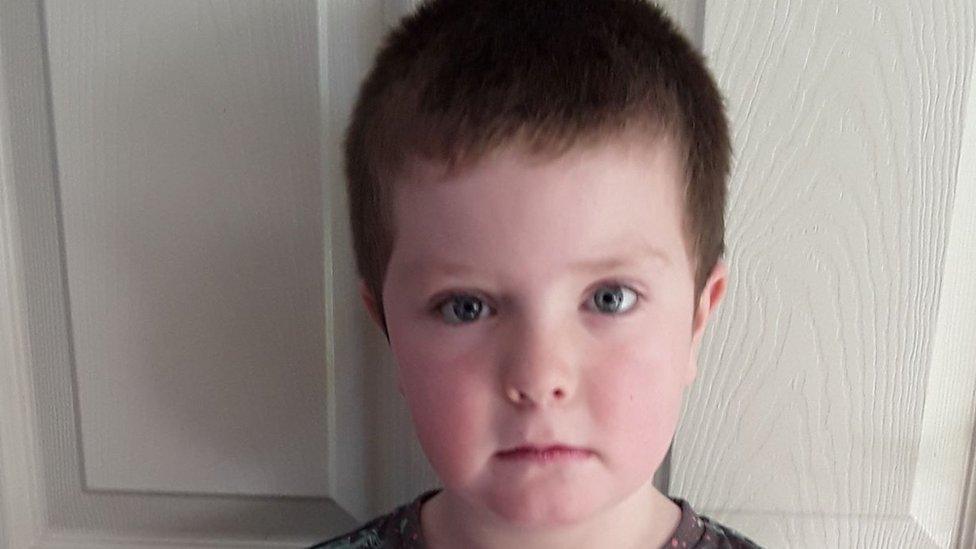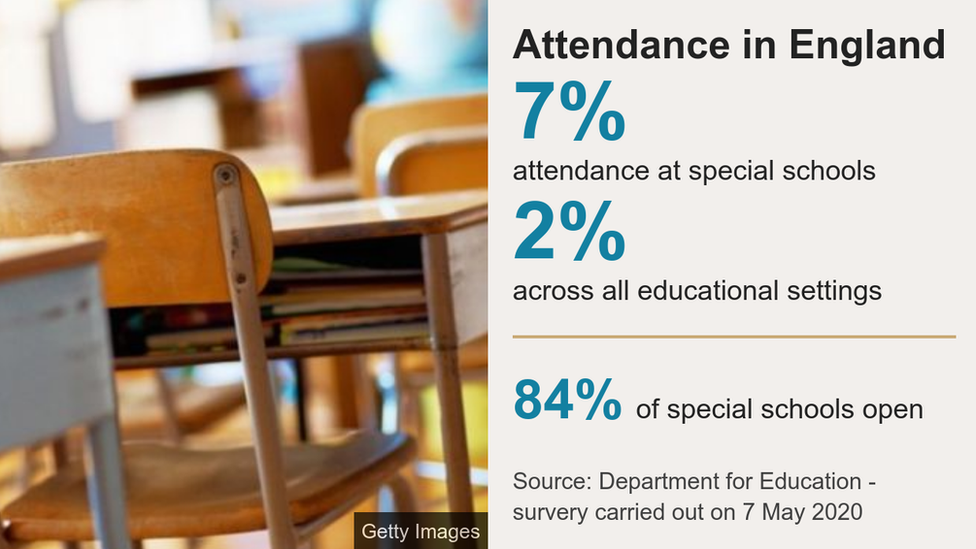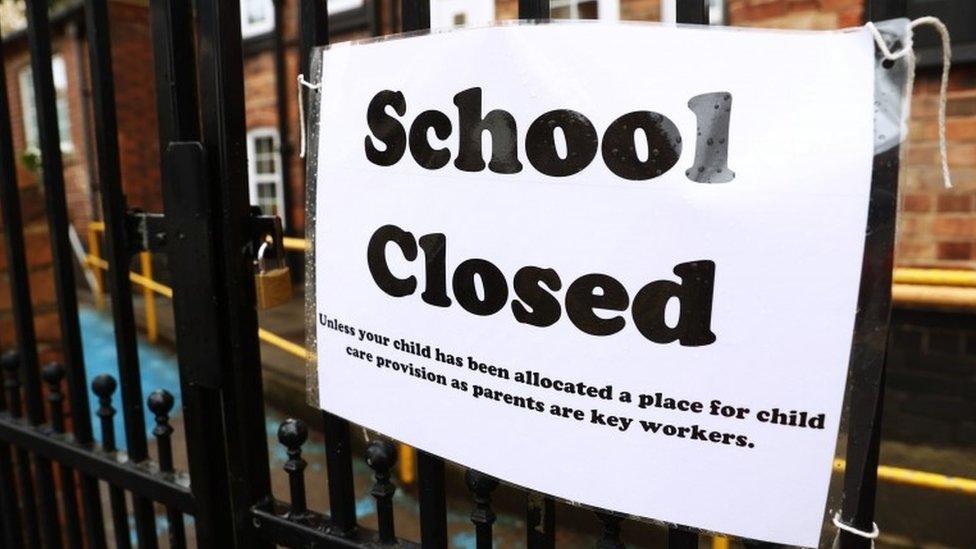Coronavirus: 'All of our respite has been taken away'
- Published

Jackie said caring for her funny and quirky son Liam with husband Pete was incredibly challenging but the hard work was worth it
A mother whose son has complex special needs has said the coronavirus pandemic has had a tough and exhausting impact on her family.
Jackie and her husband Pete look after their son Liam at their home in Devon.
The seven-year-old needs constant care and has been unable to attend his special school since 23 March.
Jackie said finding out Liam would not be able to attend was a "huge shock" that meant all of their respite had been taken away.
"We were very worried about how we were going to manage as a family," she said.
"We are now having to cope with the added exhaustion of looking after our son all day and managing his conditions, challenging behaviour and anxiety issues on little sleep.
"All of our respite has been taken away and that is incredibly hard."
Schools, nurseries and childminders were told in March to close their doors to all except the children of key workers and vulnerable pupils.

Jackie said Liam struggled with changes to his routine and his sleep issues had worsened during the pandemic
Children such as Liam, who have an education health and care plan, have been able to attend school if a risk assessment found their needs could be as safely or more safely met in the educational environment.
A Department for Education spokesperson said decisions over whether children with complex needs should attend must be taken by local authorities, schools and parents together.
Liam has autism, ADHD, high anxiety and a sleep disorder - the latter meaning he wakes for between two to four hours per night.
He also has development delay and functions many years younger mentally.
Jackie said her son's conditions meant he required care 24 hours a day care, could only concentrate for a few minutes at a time and struggled with changes to his routine.
"Our son's sleep issues have worsened during this pandemic as his anxiety is much higher, which is to be expected," she said.
"Our son does not cope very well with change so everything has to be taught through social stories and he usually likes to know in advance which is one thing we haven't been able to do as we did not know his school was closing until the day before."

A spokesman for Devon County Council, the local authority that runs Liam's school, said special schools were still open with "limited care available in school".
"The schools have carried out individual assessments done by staff alongside social care colleagues," he said.
"While we have every sympathy for this particular family, every child in a special school is a vulnerable child, clearly at some point a decision has to be made about those that are most vulnerable and those who would benefit from being in school the most."
He said school staff had been in touch with parents to listen to concerns and were trying to provide work and support for children who are at home.
Jackie said she had come up with a new routine to help Liam cope during the pandemic, creating timetables for each day that included short periods of home schooling, songs, PE and sensory breaks.
"There are incredibly tough days when our son's anxiety is much higher than others and he won't comply," she said. "So we have to lower any demands or expectations and simply do our best to calm him and use humour to distract him from his difficulties."
Edel Harris, chief executive of the learning disability charity Mencap, said while the pandemic was affecting everyone, vulnerable people needed particular support.
"We are finding at Mencap it is some of the most vulnerable people in society, including children with a learning disability and their families and carers, who seem to be being hit the hardest," she said.

Mencap chief executive Edel Harris called on local authorities to offer respite care for families where children were unable to go to school
She said calls to Mencap's learning disability helpline and engagement with the charity's online community had increased and urged parents and carers to seek support if they were struggling.
"We all know, even without coronavirus, how challenging it can be for parents to support a child with a learning disability or autism. So without respite, coupled with no school, we can see why families are so distressed," she said.
Ms Harris said calls to the helpline had included people asking for practical and emotional support.
"We have also more and more been asked just to be there as a listening ear so that when families do reach that tipping point they can pick up the phone and speak to someone who understands," she said.
"I think it is a natural consequence that we are going to see higher incidents of poor mental health in parents and with people with a learning disability themselves."
Jackie said caring for Liam "does take its toll on our mental health at times" but they had learnt to be resilient "and always find the strength to carry on".
"It is incredibly challenging and exhausting, but the hard work is really worth it," she said.
"Liam is funny, quirky and definitely unique and we wouldn't change him for the world."

SCHOOLS: When will children be returning?
EXERCISE: What are the guidelines on getting out?
THE R NUMBER: What it means and why it matters
AIR TRAVELLERS: The new quarantine rules
LOOK-UP TOOL: How many cases in your area?

- Published12 March 2020

- Published22 April 2020
